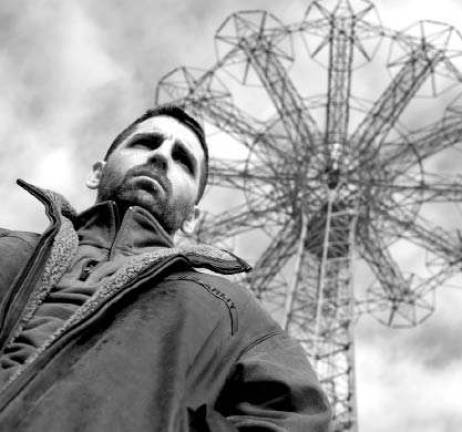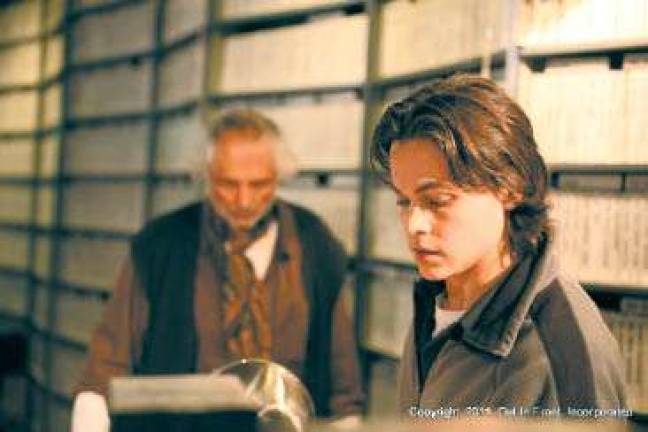Kickstarting a Movie Career


Film
A first-time director makes his debut in a crowd-funded movie
U.E.S Resident Makes NYC Directorial Debut
When film producer Atit Shah was looking for a director to work with, Upper East Side resident Ryan M. Kennedy knew he wasn't the most qualified partner.
The 21-year-old first-time director and screenwriter had never been on a movie set. He'd taken some extension courses in film, but hadn't gone to film school. His script was about a young war veteran in New York City with undiagnosed post traumatic stress disorder who works as a film projectionist. He wanted the film to be in black and white.
"There should have been a lot of red flags," Shah said about working with the inexperienced director. "But the moment I looked at the script and met Ryan, I knew he could direct, even though I'd never seen a reel."
With Shah on board, Kennedy shot "The Projectionist" in 34 days in 2011, and spent the next few years editing the film, which cost $100,000 to produce. Having privately financed the creation of the film, the pair turned to Kickstarter to fund its independent theatrical distribution, and released the film to campaign donors via digital download. They wrapped their successful campaign last month, and will release the film in New York and Los Angeles in the fall, and expect to have it on streaming platforms by the end of 2014.
For crowd funding, the tactic is unique. Most Kickstarter projects rely on donations to fund development, not distribution of a completed product, and the unorthodox model has garnered attention.
"There are a lot of films of this size and scope that are made, and it's really hard to stand out," Kennedy said. "Mostly, the reason why we're so excited that the distribution model itself is getting attention is because you can't just look at the distribution model. Once people were very, very interested in that, they take a step further and actually look at the film itself."
Sitting on a couch next to Shah at the sunny co-working office space they share, Kennedy, now 24, has a wide smile and rarely breaks eye contact. He talks a lot, and quickly, and if he were dressed in a suit rather than a black fleece, khakis and Nike sneakers, he might make an effective litigator. It's easy to imagine him convincing investors-or Shah-of his potential.
"I watch a lot of movies, and that was kind of my education in cinema," Kennedy said. "Everything I was doing on set was pure logic. I never read it in a book. It just came to me."
Though untrained in the traditional sense, Kennedy did receive some informal grooming. His grandfather was a projectionist, and when Kennedy and his siblings visited their grandparents, they had access to stacks of films and a makeshift movie theater.
"He had these bookshelves with VHS tapes and every single movie you could possibly think of," Kennedy said. "He let us watch anything. He encouraged it."
Even without a theatrical release, the critical response to the movie has been mostly positive. In early March, the film won the Audience Choice Award at the Amelia Island Film Festival in Florida, and will screen locally on Wednesday, April 9 at the Take Two Film Festival, a forum for independent films and emerging artists (all proceeds from the film's ticket sales will be donated to the Wounded Warriors Project). The festival, which takes place at Anthology Film Archives, will screen 20 films from seven different countries, and culminates in an awards ceremony. Kennedy was nominated for his directorial debut.
Kennedy and Shah, who are planning future projects together, are also pleased with the positive response from veterans who have seen the film and related to Jacob Nicks, the film's withdrawn, tortured protagonist (played by Russ Russo).
"We have veterans say, 'This is the first thing I've ever seen that can even start to explain what I've gone through," Kennedy said.
In part because of the efforts behind the grassroots distribution campaign for "The Projectionist," Kennedy is aware of the limited marketability of his film in a way he wasn't when he started shooting.
"My naivete is why this project got made," said Kennedy. "Knowing what I know now, I probably wouldn't make a black and white neo-noir film. I'm glad that I did, don't get me wrong, but any time [Shah] and I talk about a project moving forward, the first thing is like, 'can we market this? Can we get it financed? Will there be a market so we don't have to go through what we went through on this?' But thank God we did because the fact that the film isn't really marketable or doesn't look like it on paper is actually what's making us stand out."